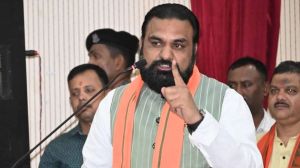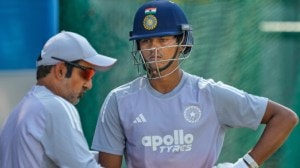The Pashtun Rockers
The busy suburban life in Lahore is a far cry from Pakistans mountainous Khyber Pakhtunkhwa.
Zeb and Haniya reveal how they became Pakistans first all-woman music band and how they broke stereotypes
The busy suburban life in Lahore is a far cry from Pakistans mountainous Khyber Pakhtunkhwa (earlier known as the North-West Frontier Province). Yet,on languid summer afternoons,as Zebunnisa Bangash and Haniya Aslam,first cousins and close friends,lounged at their maternal grandparents parlour in Lahore,listening to their grandmother sing Paimana Bitte,a Pashto folk song,a vision of a life long-abandoned would come alive. An uncle would pluck at the lute-like rubab,while an aunt would lend a voice. Cousins would join in. The folk song would be followed by ghazals by Shamshad Begum or Malika Pukhraj,and old Raj Kapoor movie melodies would be sung with great gusto. The music would continue,fluid and effervescent,bridging generations and cultures. And would lead to the birth of Pakistans first all-woman band.
Years later,in the US,where the cousins were at college Aslam at Smiths in Massachusetts and Bangash at Mount Holyoke College,across town from Smith they met up on another lazy afternoon,this time during their winter break. Wandering across dorm basements,they lingered at an abandoned bookstore-cum-cafe. They exchanged ghost stories and after a lot of tomfoolery,Aslam brought out her guitar. Bangash hummed a song,Chup,a spontaneous,light-hearted,cheapster-ish song, she says,followed by their old favourite Paimana Bitte. I had just learned to play the guitar and had bought my own. Back home,I had never had a chance to learn how to play it because the teachers were mostly young men, says Aslam,with a grin,who learned to play the tabla instead at home. Bangash had experimented with various genres she had been exposed to in college,after her classical training back home with vocalist Ustad Mubarik Ali Khan,one of Pakistans noted classical exponents.
Chup went on to become the title track of their debut album in 2007,three years after the cousins uploaded the two tracks on YouTube and received an overwhelming response. They were played on Lahore-based radio stations,and stalwarts like Pakistani musician and producer Mekaal Hasan came out in praise of their work. Coke Studio Pakistan followed,taking their music to an audience across nations. We never thought of ourselves as musicians. At home,none of our family members were great singers,but they could carry a tune and play instruments,and there were tons of music sources around the house from ghazals to VHS cassettes of Geetmala,Indian film music to Cliff Richards and Abba, says Bangash.
Apart from Pakistan,the two have had live performances in the US,Malaysia,Italy,Norway and France.
In India to perform for their debut performance at the just-concluded South Asian Bands Festival,Aslam and Bangash,the 33-year-old duo are,however,no strangers to the country. After their first visit in 2009,the two recently collaborated with music director Shantanu Moitra and lyricist Swanand Kirkire for a song,Kya khayal for the television programme The Dewarists. Ahead of their Delhi concert,they also held a few informal concerts in Chennai. We hope to be back in a couple of months,in time for the baul festival in Shantiniketan, says Aslam.
Their music stands apart because of a mix of classical elements,jazz,blues and Latin American or west African groove. The nasal twang,reminiscent of a Farida Khanum ghazal,is offset by nuances of Turkish music,picked up from the time the two cousins spent in Istanbul,where their fathers,an army man and a civil servant,were posted. The guitar is complimented by the delicate flutter of the rubab,while drums and trumpets lend a baroque touch. Their songs,sung mostly in Urdu,with a smattering of Hindi,speak of hope,and love because initially when you fancy yourself to be a musician,you rather unimaginatively fall back on love songs, says Aslam.
But hope is something they bank on rather seriously. The situation in Pakistan is unfortunate and as a Pakistani its difficult for us too,but we need to face it that things are the way they are, says Bangash. The two composed a song called Happy Song,following the assassinations of leaders Shahbaz Bhatti and Salman Taseer earlier this year that speaks of the need to heal festering wounds and look ahead. The song will feature in their next album.
With their origins in Kohat,Khyber Pakhtunkhwa,their music references their Pashtun lineage through a repertoire of folk songs,but the two,rather surprisingly,seem to have broken free of stereotypes. I think it surprised us,as well,how easily things fell into place. But we never faced the problems which people imagine two Pathan women musicians would face, says Aslam. Our families were hugely supportive,and actively encouraged us to have a career,even if it meant having stage shows. Every press clipping is still cut out,saved in a scrapbook and shown to relatives,our songs feature as their ringtones. Sometimes,its quite embarrassing, says Bangash.
Almost in a bid to liven things up after the peaceable acceptance of their chosen career at home,Aslam would wrap herself up in a chador before her performance and then go up on stage and pick up the guitar. The shock factor was enormous. You could almost see it running through peoples mind,how anachronistic a musician in a salwar kameez and a chador looked,with a guitar in hand, she says,But at home we wear salwar kameezes and its something we are comfortable in,I have always wondered why we should dress differently now that we were a music band, she says.
Their struggles,however,were of a different sort,something that went beyond gender and the cultural stereotypes. It involved copyright issues and restrictive contracts and media moguls wanting to exert their will over yours. We had great support from our musician colleagues (their debut album featured leading pop artists of Pakistan,like Shallum Asher Xavier of Fuzon and Mekaal Hasan),but it was difficult to get a hang of how the recording industry worked, says Bangash,It took us a long time to come up with our debut album although we began playing as early as 2004.
The two are now working on an EP (Extended Play),which should be ready for release around March. The six songs have been written by them and,like their debut album,will feature collaborations with guest artists. The soundscape of Asia is evolving continuously,and its an exciting time to be a musician. Its difficult to say that our music belongs to a particular genre,because we are constantly imbibing new things and using them, says Bangash.



- 01
- 02
- 03
- 04
- 05




























